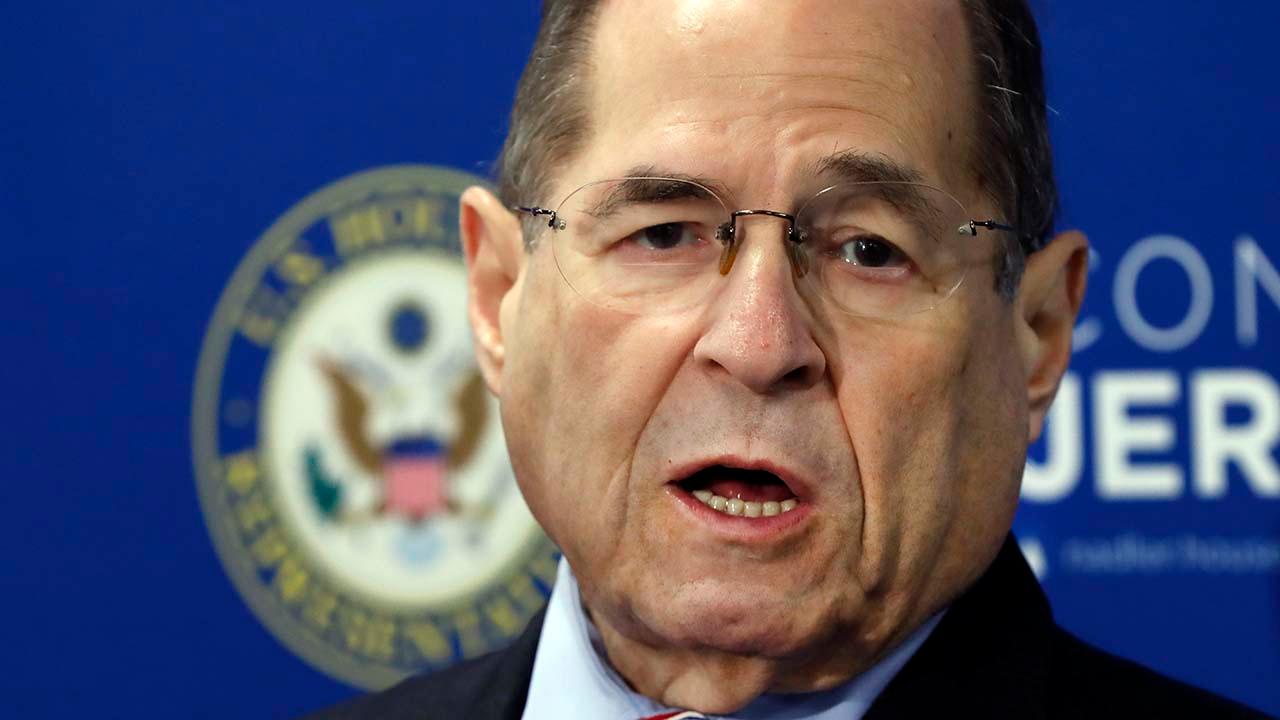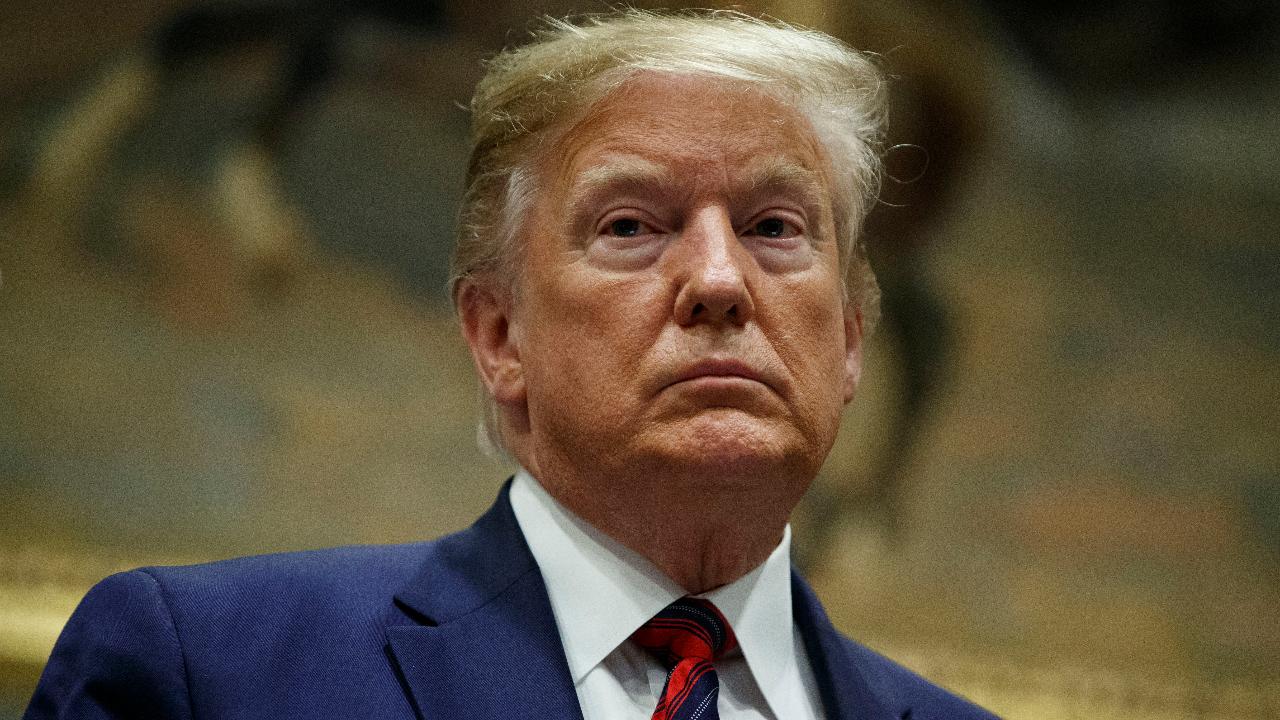Pelosi grapples with Democratic Party's impeachment obsession
Democrats double down on impeachment; reaction from Arizona Rep. Andy Biggs and radio talk show host Larry Elder.
House Speaker Nancy Pelosi, D-Calif., is lucky that Congress is not in session this week. Capitol Hill would have exploded with demands for impeachment after Special Counsel Robert Mueller announced Wednesday that charging President Trump was not an option.
The timeout gives Pelosi and company a chance to let the air out of the balloon. Allow things to simmer for a bit.
Granted, the fortuitous scheduling may only serve to delay a push among Democrats to open an impeachment inquiry. Pelosi, as she often does, may have to once again finesse a decision on how Democrats proceed.
LESLIE MARSHALL: MUELLER HAS GIVEN DEMOCRATS A GIFT – AND PASSED THE BUCK
At the very least, the first question Democrats must resolve is whether or not they subpoena Mueller since he will not appear willingly for a closed-door interview or a public hearing. House Judiciary Committee Chairman Jerry Nadler, D-N.Y. sidestepped this question at a news conference Wednesday afternoon in New York, saying only that "all options are on the table and nothing should be ruled out."
The House is back in session next Tuesday. And, much like two weeks ago, we could see more lawmakers – even middle-of-the-road to moderate Democrats – who are willing to go to the mat with the administration and perhaps push for impeachment.
There are several ways for the House to "launch" an impeachment inquiry. In some ways, it's rather easy. Consider that Rep. Al Green, D-Texas, has already introduced articles of impeachment. You simply walk into the House chamber and drop your impeachment resolution in the hopper. That initiates things.
There is also a more formal process. After the completion of the Starr Report probing the conduct of President Bill Clinton in late 1998, the House Judiciary Committee began writing articles of impeachment. The committee conducted no real inquiry of its own, rather parroting Starr's work and basing their impeachment push on his findings. The Committee approved four articles of impeachment. The full House approved two of the four articles in late 1998 and sent them along to the Senate for a trial in 1999 that ended in Clinton's acquittal.
MUELLER NEWS CONFERENCE PUTS NEW IMPEACHMENT PRESSURE ON PELOSI
However, things were much different in the mid-1970s under President Richard Nixon. Back then, Rep. William Fitts Ryan, D-N.Y., prepared articles of impeachment against President Nixon as early as May 1972, a month before the burglary at the Watergate.
The Senate has no formal role in preparing articles of impeachment. That is the sole province of the House. The Senate only decides if lawmakers should remove an impeached official from office.
After the Watergate break-in, the Senate empaneled the Watergate Committee to probe the scandal. That action gave impetus to the House Judiciary Committee to begin work on efforts to impeach President Nixon down the road.
Ironically, House Democrats nearly lost their chance to bring an impeachment resolution against Nixon. Rep. Robert Drinan, D-Mass., introduced articles of impeachment in the summer of 1973 over the secret bombing of Cambodia. Then-House Majority Leader (and future Speaker) Tip O’Neill, D-Mass., said that Drinan "had a good case. But he damn near blew it." O'Neill believed the House would have overwhelmingly defeated Drinan’s impeachment resolution, thus putting lawmakers on the record as opposing impeachment and perhaps causing them to lack the political will to move later.
Such a scenario could come into play now. Politically, it may be best for Democrats to pause and wait for exactly the right moment to move against Trump.
ANDY: MCCARTHY: 'EXPLOSIVE' MUELLER REMARKS SET UP IMPEACHMENT TALK 'FOR FORESEEABLE FUTURE'
The right moment for Democrats in 1973 was the Saturday Night Massacre that October. That’s when President Nixon canned Special Prosecutor Archibald Cox. Attorney General Elliot Richardson and Deputy Attorney General William Ruckelshaus resigned because they refused to sack Cox. However, Solicitor General (and future failed Supreme Court nominee) Robert Bork followed through on Nixon’s bidding and dismissed Cox. Lawmakers drew up multiple resolutions to impeach Nixon over the following days.
The Judiciary Committee voted to start an impeachment inquiry in late October 1973. The full House voted 410-4 in February 1974 to authorize the Judiciary panel to formally begin an impeachment proceeding.
The panel spent months sparring with the administration over subpoenas, testimony, and the fabled “Watergate tapes.” By the end of July, the committee approved three of five proposed articles of impeachment. The measure never went to the floor, because Nixon resigned in early August 1974.
In short, there is not a singular format to follow when it comes to impeachment. The House could even take Green's resolution to impeach the President directly to the floor. If the House approves Green's measure, Trump is impeached. It's that simple.
The full House has only impeached 19 persons in the history of the Republic: 15 judges, one senator, one Cabinet member, and two presidents. (Clinton and Andrew Johnson). One of the impeached judges is current Rep. Alcee Hastings, D-Fla.
TREY GOWDY: MUELLER STATEMENT WILL CAUSE 'STATE OF CHAOS' UNTIL 2020 ELECTION
The Senate has conducted 16 trials of impeached figures, convicting eight (including the aforementioned Hastings, thus removing him from the federal bench). The last House impeachment came in 2010 against U.S. District Judge Thomas Porteous for misconduct. The Senate then convicted and removed Porteous that December.
In that case, the Judicial Conference of the United States – a coalition of senior federal judges led by Supreme Court Chief Justice John Roberts – initiated the impeachment proceedings against Porteous and transmitted its demand to the House. The House, and subsequently the Senate, then took action.
CLICK HERE TO GET THE FOX NEWS APP
The Constitutional bar for impeachment is "treason, bribery, or other high Crimes and Misdemeanors." The latter two terms are ill-defined and vague. This is what sparks the debate over the threshold for impeachment. Fundamentally, it comes down to what is decided as "fitness" for office. In fact, Alexander Hamilton made the case in the Federalist Papers that impeachable offenses stemmed from "the misconduct of men, or in other words, from the abuse or violation of some public trust."
Ultimately, the debate over impeachment is political and about the perception of someone's fitness for office.
And, as Democrats learned in 1973, those pushing for impeachment are best to mark time. Had the House moved on Drinan’s resolution to impeach President Nixon before the Saturday Night Massacre, history likely would have veered off in a very different direction – perhaps even allowing Nixon to serve out the balance of his term.
















































